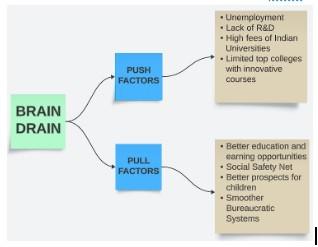Mains Daily Question
Nov. 2, 2023
Q.3 Examine the effects of brain drain on India’s economy. Is it entirely detrimental to India’s economic prospects?(10M, 150W)
|
Approach to the answer: Introduction: Type 1: Define Brain Drain and highlight its significance in the context of global human capital movement. Body: Heading 1: Discuss the Impacts of Brain Drain on India's Economy in a structured manner: Heading 2: Present the Positive Aspects of Brain Drain: Conclusion: Type 1: Summarize the multifaceted nature of Brain Drain, acknowledging its dual impact on India's economy. Type 2: Highlight government initiatives as a positive step towards mitigating Brain Drain. |
Answer: “Brain Drain” refers to the international transfer of human capital resources and it is applied mainly to the migration of highly educated people from developing to developed countries. As per the data by MHA, more than 6 lakh individuals renounced their citizenship in last 5 years.
Impacts of Brain Drain on India’s Economy
- Skills Shortage: Shortage of skilled professionals in critical sectors like healthcare, engineering, and technology, which hampers India's economic growth and development.
- India being a major exporter of healthcare workers to developed nations faces shortage in nurses and doctors (1.7 nurses per 1,000 population and a doctor to patient ratio of 1:1,404)
- Economic Loss: India invests significantly in educating and training professionals. When they emigrate, it represents a loss of the country's investment in human capital as high-skilled emigrants do not pay taxes in their home country after leaving.
- About 8 lakh students travel abroad for higher education every year and these students spend $28 billion or 1 per cent of India’s GDP in foreign countries.
- Impact on Research and Development: The departure of scientists, researchers and academics diminishes the pool of innovative thinkers and creators within the country. This hinders technological advancements in various fields.
- Weaker Workforce: Overall quality of the Indian workforce is weakened as many highly skilled individuals leaves the country, leaving a skills gap in critical industries.
- By 2025, biggest tech skills gap will lie in data protection (30%), followed by AI/machine learning (29%) and cloud computing (27%) in India.
- Increased gap between developing and developed nations: Because of concentration of human capital in the most advanced economies, there is an increase the technological and economic gap between developing and developed nations.
Brain Drain is not completely detrimental:
- Remittances: Emigration from India will provide remittances and skills to Indians.
- Remittances to India in 2022 were over US $100 billion, nearly 3% of India’s GDP.
- Soft Power: It plays a role in strengthening Indian interests abroad as Indians act as a soft power multiplier for the country.
- For instance, since 2010, over 10 million Indians have emigrated and the size of the Indian diaspora is now over 30 million.
- Potential for Brain Gain: External Affairs ministry is of the view that the ‘brain drain' has now becoming a ‘brain gain'. In multiple cases, emigrants return to India with new skills, experiences, and resources, contributing positively to the economy in the long run.
Certain initiatives like The Ramanujan Fellowship, INSPIRE Programme, Visiting Advanced Joint Research (VAJRA) Faculty Scheme etc have been taken by India to prevent excessive Brain Drain. It is imperative that India focuses on retaining its brightest minds, who are helping other countries in achieving technological and economical progress. To achieve this, establishment of a high class public education system and essential structural reforms is the way forward.


